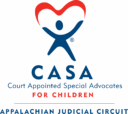A CASA or Court Appointed Special Advocate is a trained community volunteer, appointed by a judge, to speak up for the best interest of an abused or neglected child involved in a juvenile court proceeding.
Why CASA?

Every child should have a safe, loving, and permanent home, but many do not. Each year in Georgia, thousands of children enter juvenile court because they are victims of abuse or neglect. Many of the children are taken from their homes and placed in the overburdened foster care system, where they can get “lost” for months or even years of their lives.
Georgia’s Court Appointed Special Advocate programs provide an innovative, cost-effective approach to an urgent crisis. Community based programs recruit, screen, train, and supervise volunteers to provide individualized advocacy for these innocent victims and an independent source of information for the judge who must decide their future.

Who does a CASA work with?
A CASA works with an abused or neglected child and anyone who may be able to serve that child’s best interest which includes: court and school officials, case managers from the Division of Family and Children Services (DFCS), and members of that child’s family. Although a CASA is not an attorney, a CASA does work with a Guardian ad Litem (GAL), a child’s attorney, when a GAL is appointed to represent a child in court. Guardians ad Litem sometimes work on as many as 60-80 cases at a time in both Superior and Juvenile Court. Meanwhile, Case Managers sometimes work on 40-60 cases at a time. CASA programs train and support volunteers who handle one – three cases at a time. A CASA Volunteer can provide time and energy that others in the system may not be able to provide. A CASA collaborates with other service providers and the child’s family in order to advocate for “one child at a time.”
